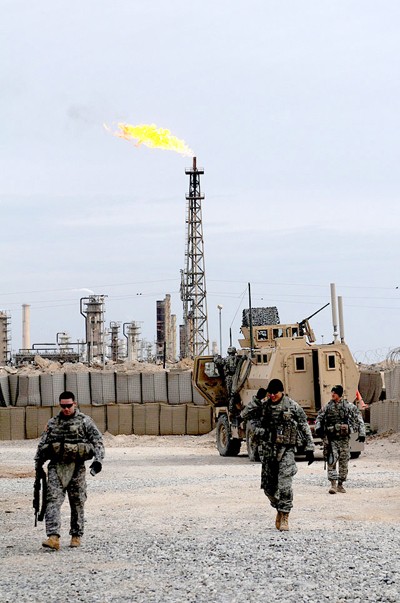Oil rose back above $ 114 a barrel on Tuesday, to stop the downward path of the highest level in nine months, supported by the escalating conflict in Iraq and the stalled supplies from Libya and expectations of lower crude inventories in the United States. Violence did not affect the supply of oil from Iraq’s southern ports, a port for almost all the country’s exports. But analysts expect it to remain tension in the country’s second-largest crude producer in the Organization of “OPEC” a positive factor to support prices.
The Brent crude rose 12 cents to 114.24 dollars a barrel at 1137 GMT, after declining from its highest level in nine months at U.S. $ 115.71 hit on Thursday. Bryant scored the biggest daily decline since May 16 (May) Monday. U.S. crude rose 15 cents to 106.32 dollars per barrel.
In Libya, where unrest hamper oil production, oil port was closed again after it re-opened at the weekend. The country’s production of about 270 thousand barrels per day, a fraction of the production, which reached 1.6 million barrels per day before the outbreak of the civil war in 2011. In addition to geopolitical risks that threaten supplies, investors focused this week on oil inventories in the United States. He predicted a Reuters survey, U.S. crude stocks drop 1.3 million barrels on average last week and rising inventories of petroleum products. On the other hand the spokesman of the Iraqi Oil Ministry, Monday, oil exports increased continuously. For his part, said Asim Jihad, a spokesman for the oil ministry said that “oil exports continues to increase.”
Jihad said Monday that “the oil fields in the south of the country continues to produce, this consisted of an increase in oil exports.” He explained that “production has reached more than two million, five hundred thousand barrels per day,” noting that “this percentage will be higher export rate since 2003 until now.” However, that “the security situation has affected the northern fields.” As confirmed by the expert in the field of oil that Iraqis make up 85 percent of the workers in the oil rights, an economist denied reports that talk about the withdrawal of investment companies from Iraq because of security problems. Hamza said the jeweler, an expert in the field of oil that “85 percent of the workers in the oil rights are Iraqis.”
The Jeweler’s agency “Wi-News”, that “the oil-producing fields located in the south of Iraq, so it is far from the troubled areas,” pointing out that “foreign companies are responsible for the development of the oil sector only.” He pointed out that “oil production in the troubled areas of security is turned off before the outbreak of the recent security incidents in Mosul, so there is no new effect on oil exports.” He added that “over the stop line Ceyhan more than four months, and by that time he was working a quarter of its operational capacity,” revealing that “52 process subversive streak in one year led to the suspension of work in this line.”
In turn, denied economic expert Majid picture, that “the withdrawal of investment companies from troubled areas,” stressing that “the oil companies in the south of the country are still working and producing.” The picture that “some investment companies in troubled areas began the protection of themselves, while some foreign employees left their companies because of the security situation is precarious security.” He pointed to “increasing Iraqi oil production,” stressing his arrival to “a hundred 2,000,006 barrels a day after he was two million, four hundred barrels a day only.”
“The security and political conditions affecting the economic side, but what is happening in Iraq is a physical and psychological effect”, noting that “the psychological impact, which is playing its role in the present time.” He pointed out that “the psychological impact created high prices and the emergence of traders and speculators, traders emergence of opportunities and crises,” stressing that “the Iraqi revenues will not be affected.”
He believed that “the economic downturn will be in the areas of security disruptions,” noting that “this decline will not appear now, but it appears with the reflection of the business cycle.”
almadapaper.net
